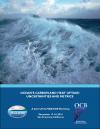All Announcements

Research Highlight: More frequent droughts and floods likely in California later this century
In the future, the Pacific Ocean's temperature cycles could disrupt more than just December fishing. Known collectively as the El Niño Southern Oscillation, or ENSO, the changing seasonal phenomena known as El Niño and La Niña could lead to at least a doubling of extreme droughts and floods in California later this century.

Webinar series on process studies
The PSMI Panel is organizing a set of webinars (45 minutes in length each) on process studies from November 2015 to March 2016. The goals of this webinar series are to provide feedback on the plans and challenges for individual process studies and distill programmatic lessons learned. For information on how to log in, view the calendar on the PSMI webpage and click "look for more" to see the complete list.

Workshop report on Ocean's Carbon and Heat Uptake
A workshop jointly sponsored by the US CLIVAR and OCB Programs was convened in December 2014 on “Ocean’s Carbon and Heat Uptake: Uncertainties and Metrics” and the challenges of improving observations, process understanding, and modeling. Building on the efforts of the Ocean Carbon Uptake and Southern Ocean Working Groups, this workshop report features key highlights and recommendations for the community.

Research Highlight: Tropical Pacific decadal trends during global warming hiatus
Earth’s surface air temperature has significantly increased over the 20th century, although this overall global warming has been punctuated by periods of weaker/stalled warming or even cooling. Research suggests that shifts in the circulation of the Pacific Ocean and atmosphere have played a key role in the present hiatus’ development.

Research Highlight: Is the melting Arctic making cold US winters more likely?
In early January 2014, an Arctic air outbreak brought extreme cold and heavy snowfall to central and eastern North America, causing widespread disruption and monetary losses. However, new research by Screen et al., using state-of-the-art climate model simulations, finds that the risk of North American daily cold extremes decreases in the future.

Apply to attend the Paleo AMOC Workshop
On May 23-25, 2016, paleoceangraphy and physical oceanography researchers will gather for a workshop on Connecting Paleo and Modern Oceanographic Data to Understand AMOC over Decades to Centuries. Participation will be limited to 60 people. Applications are due by January 21.

Research Highlight: El Niño-related sea level extremes to increase with greenhouse warming
Over the coming decades, the tropical Pacific is likely to experience more extreme sea level swings on timescales of several years. The culprit is a change in the El Niño-Southern Oscillation and its characteristic Pacific wind response, according to a new study using CMIP5 climate change projections.

Research Highlight: The more extreme nature of US warm season climate
Arid and semi-arid regions are projected to experience the most adverse impacts of climate change. Intensifying drought and precipitation extremes are found in the observational record and current global climate projections according to the recent IPCC report.

Sign-up for the webcast of Translating Process Understanding to Improve Climate Models workshop
Remote participation will be available during the plenary sessions of the upcoming workshop, Translating Process Understanding to Improve Climate Models, to be held October 15-16 at NOAA GFDL. Registration must be received before the workshop begins. Remote participants will be able to ask questions via a chat box.

Miss the Intra-Americas Seas virtual workshop?
Video recordings and presentations are now available for the Observing & Modeling Climate Variability in the Intra-Americas Seas & Impacts on the Continental Americas & the Caribbean workshop. Also check out the posters in the gallery and submit questions/comments by September 23.
